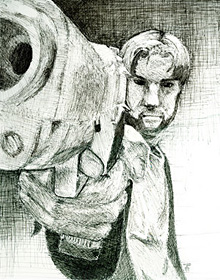 |
 |
 |
 Editorials | Issues | April 2007 Editorials | Issues | April 2007  
US Smuggling Abets Mexican Smuggling
 San Antonio Express-News San Antonio Express-News


| | (deviantART) |
The flow of undocumented workers into the United States generates as much venom as any issue on the political landscape.

But few people talk about another flow, also illegal, that heads in the opposite direction.

Weapons pour into Mexico from the United States, many of them combat-style rifles that find their way into the caches of cartels fighting for control of the drug trade.

Arms head to Mexico, and drugs come back, a pernicious, destructive cycle that creates chaos on both sides of the border.

Mexican authorities confiscated 10,579 weapons in 2005, with 90 percent of those smuggled from the United States, the Arizona Republic reported.

The number of confiscated weapons began growing after the end of the U.S. assault weapons ban in 2004, an increase exacerbated by regulations that do not require private sellers to do background checks or keep records on buyers.

The lax rules allow smugglers to hire middlemen, known as straw purchasers, to buy the guns that are eventually transported across the border.

Fueling the drug wars in Mexico, the smuggled guns are believed to be the weapons used in most drug cartel executions, including the more than 100 murders in Nuevo Laredo in 2005.

"There's an iron river of guns flowing to Mexico," Thomas Mangan, a spokesman for the U.S. Bureau of Alcohol, Tobacco, Firearms and Explosives, told the East Valley Tribune in Mesa, Ariz.

After U.S. firearms agents beefed up their anti-smuggling campaign in South Texas, officials announced their initial success near Laredo, a seizure that included assault rifles and improvised explosive devices, the Houston Chronicle reported.

Despite the successful raid earlier this year, Mexican officials have demanded the U.S. step up its effort to thwart gun smuggling.

"It's truly absurd that a person can get together 50 to 100 high-powered arms, grenade launchers, fragmentation grenades and can transport this cargo into our country," Mexican Attorney General Eduardo Medina Mora said, according to the Associated Press. "It's a task that needs a much more decided and determined effort from the U.S. government, and it's one of the demands we have put on the table."

With a border that has become as porous as the river that defines it, problems do not respect international boundaries. The drug crisis reflects that phenomenon. The guns smuggled into one country abet the smuggling of drugs into the other.

The two nations must work together. Mexican President Felipe Calderón has cracked down on drug violence in Mexico, but his efforts must be complemented by an equally determined effort on this side of the border.

Without such an effort, the chaos will continue or, worse, grow. | 
 | |
 |



